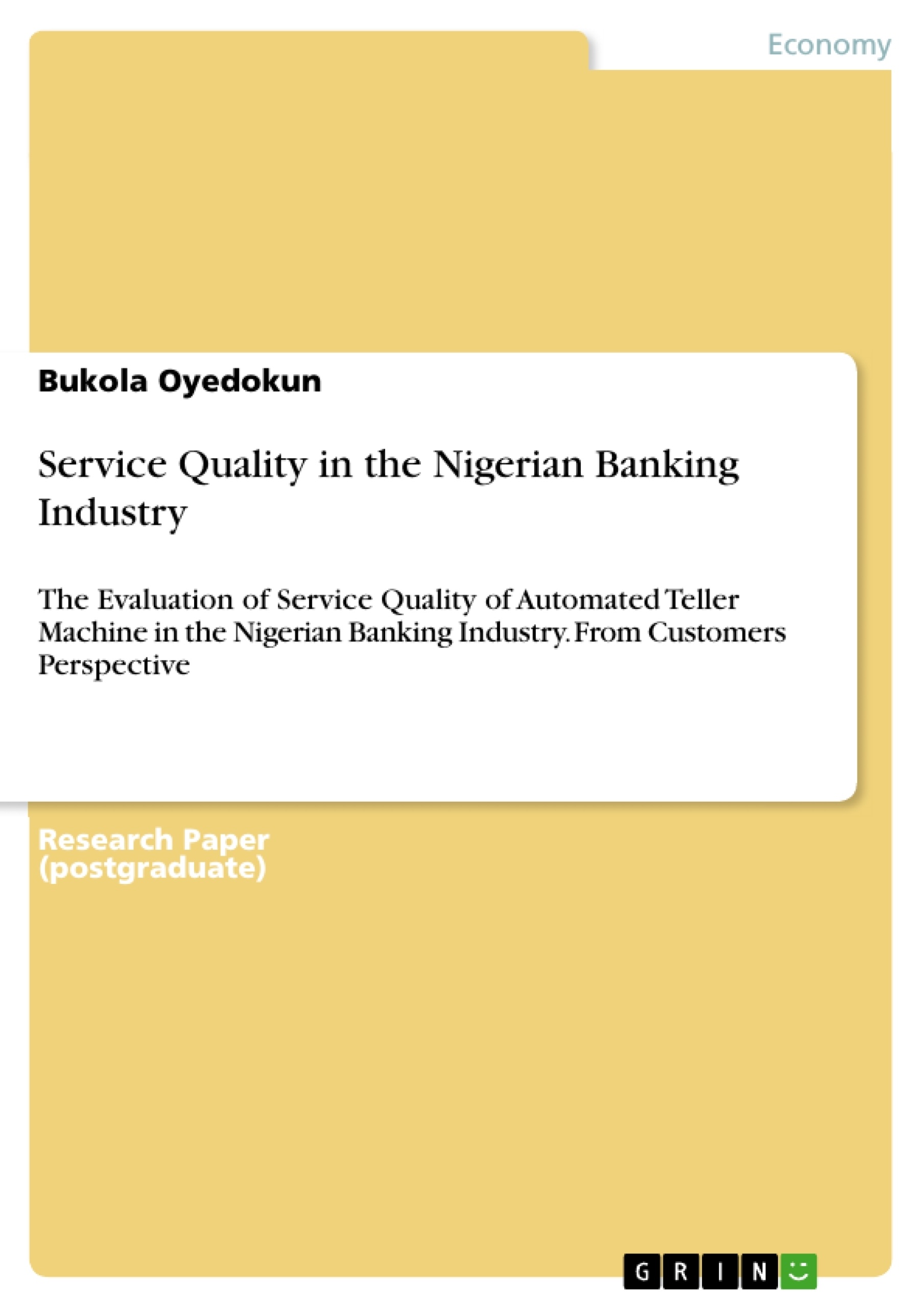This research was undertaken to examine the overall customer satisfaction with service quality delivered by Nigerian Banks through the use of ATM and to also ascertain whether some service quality factors exert a strong influence on the level of customer satisfaction; The concept of service quality has become eminent in every business discourse; a high service quality serves as an incentive for customers to come back due to satisfaction. To consistently maintain a high level of customer service, service firms must recognize that every aspect of their business has an impact on the customer.
In this study, two types of data were collected; Primary Data and Secondary Data. This was necessary since it helped to add to the findings of the researcher. A simple random sampling and purposive sampling method were used. This ensured that every member of the population had an equal chance of being part of the sample. The sample size chosen was 200 bank customers.
It was revealed in the survey that customers think that the banks need to improve on their quality of ATM services and a high number of the customers are willing to switch banks for the sole reason of an ATM that offers the highest service quality.
The study also revealed some of the problems associated with the services provided by the ATM that the customers dislike and want to be adjusted, they are ATM cash out, the limit placed on daily withdrawal, Transaction error, slow response to dispute resolutions, Network problems, Long queues, Security issues and Card retraction.
Inhaltsverzeichnis (Table of Contents)
- ABSTRACT
- INTRODUCTION
- Background to the study
- Statement of the problem
- Objectives of the study
- Research Questions
- Significance of the study
- Scope of the study
- Limitations of the study
- Definition of Terms
- LITERATURE REVIEW
- Concept of Service Quality
- Dimensions of Service Quality
- Service Quality in the Banking Industry
- Theories of Service Quality
- The SERVQUAL Model
- Customer Satisfaction
- Factors Influencing Customer Satisfaction
- ATM Service Quality
- Customer Perception of ATM Service Quality
- RESEARCH METHODOLOGY
- Research Design
- Population of the Study
- Sample Size and Sampling Technique
- Method of Data Collection
- Instrument for Data Collection
- Data Analysis Techniques
- DATA PRESENTATION AND ANALYSIS
- Demographic Characteristics of Respondents
- Analysis of Customers' Perception of ATM Service Quality
- Relationship between Service Quality Dimensions and Customer Satisfaction
- Factors Influencing Customer Satisfaction with ATM Service Quality
- DISCUSSION OF FINDINGS
- SUMMARY OF FINDINGS
- CONCLUSION
- RECOMMENDATIONS
- REFERENCES
- APPENDICES
Zielsetzung und Themenschwerpunkte (Objectives and Key Themes)
This research investigates customer satisfaction with the service quality delivered by Nigerian banks through the use of Automated Teller Machines (ATMs). It aims to determine if certain service quality factors exert a strong influence on customer satisfaction levels.
- The importance of service quality in the banking industry.
- The factors that influence customer satisfaction with ATM services.
- The relationship between service quality and customer satisfaction.
- The impact of ATM service quality on customer loyalty and retention.
- The challenges and opportunities facing Nigerian banks in providing high-quality ATM services.
Zusammenfassung der Kapitel (Chapter Summaries)
- Abstract: This chapter introduces the research topic, its objectives, and a brief summary of the findings. It highlights the importance of service quality in the banking industry and the need to understand customer expectations regarding ATM services.
- Introduction: This chapter provides a detailed background of the study, outlining the context of service quality in the Nigerian banking industry and the growing significance of ATM services. It addresses the problem statement, objectives, research questions, significance of the study, scope, limitations, and definition of terms.
- Literature Review: This chapter explores the theoretical and empirical literature on service quality, customer satisfaction, and ATM service quality. It examines the SERVQUAL model and other relevant theories, highlighting the key dimensions of service quality and the factors influencing customer satisfaction. It also reviews existing research on customer perception of ATM service quality.
- Research Methodology: This chapter details the research design, population, sample size, sampling techniques, data collection methods, instruments used, and data analysis techniques employed in the study.
- Data Presentation and Analysis: This chapter presents the findings of the research, including descriptive statistics, demographic characteristics of respondents, analysis of customer perception of ATM service quality, and the relationship between service quality dimensions and customer satisfaction.
Schlüsselwörter (Keywords)
This research focuses on the evaluation of service quality in the Nigerian banking industry, particularly concerning Automated Teller Machines (ATMs). The key themes include service quality, customer satisfaction, ATM service quality, customer perception, and the factors influencing customer satisfaction. The study explores the SERVQUAL model and its application to the banking context. The research aims to contribute to the understanding of customer experiences with ATM services in the Nigerian market.
Frequently Asked Questions
What is the main focus of the research on Nigerian banking?
The research examines overall customer satisfaction with service quality delivered by Nigerian banks specifically through Automated Teller Machines (ATMs).
What are the common problems customers face with ATMs in Nigeria?
Common issues include ATM cash-outs, daily withdrawal limits, transaction errors, slow dispute resolution, network problems, long queues, and security concerns.
How does service quality impact customer loyalty?
High service quality serves as an incentive for satisfaction; the study reveals many customers are willing to switch banks for better ATM service quality.
What model is used to evaluate service quality in this study?
The research refers to the SERVQUAL model, which identifies key dimensions of service quality and their relationship with customer satisfaction.
What was the sample size for this research?
The researcher surveyed 200 bank customers using simple random and purposive sampling methods.
- Arbeit zitieren
- Bukola Oyedokun (Autor:in), 2014, Service Quality in the Nigerian Banking Industry, München, GRIN Verlag, https://www.grin.com/document/973070



